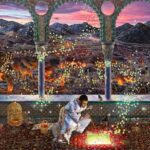 The Huntington Library, Art Museum, and Botanical Gardens will present the culmination of the national touring exhibition “Raqib Shaw: Ballads of East and West” from Nov. 16, 2024, through March 3, 2025. Raqib Shaw is a London-based artist known for his opulent and fantastical works that blend Eastern and Western influences to create mesmerizing paintings that merge fable, history, and autobiography. The exhibition surveys two decades of Shaw’s career and unfolds in two locations in the Huntington Art Gallery. Seven paintings will be on view in the North Passage, and two new tapestries will be installed in the upper register of the grand staircase.
The Huntington Library, Art Museum, and Botanical Gardens will present the culmination of the national touring exhibition “Raqib Shaw: Ballads of East and West” from Nov. 16, 2024, through March 3, 2025. Raqib Shaw is a London-based artist known for his opulent and fantastical works that blend Eastern and Western influences to create mesmerizing paintings that merge fable, history, and autobiography. The exhibition surveys two decades of Shaw’s career and unfolds in two locations in the Huntington Art Gallery. Seven paintings will be on view in the North Passage, and two new tapestries will be installed in the upper register of the grand staircase.
“We are delighted to partner with the Frist Art Museum and the Isabella Stewart Gardner Museum to bring this mesmerizing exhibition to The Huntington and present Raqib Shaw’s first solo museum exhibition on the West Coast,” said Christina Nielsen, Hannah and Russel Kully Director of the Art Museum. “Shaw’s luminous paintings, which are deeply influenced by and often directly responding to world-renowned Old Master artworks, will be shown in conversation with the masterpieces in The Huntington’s historical art collection.”
Born in Kolkata (formerly Calcutta), India, in 1974, Shaw spent most of his childhood in the Kashmir Valley, which he remembers as a paradise on Earth encircled by the Himalayas. He left as a teenager when the region erupted in sectarian conflict. References to the beauty and trauma of his childhood appear throughout his work. Shaw relocated to New Delhi in 1992 and was immersed in his family’s business of selling jewelry, textiles, and carpets. On a trip to London in 1993, he fell in love with the Old Master paintings at the National Gallery. He eventually moved to London in 1998 to study art and has lived there ever since.
Through highly personal imagery, Shaw combines iconography from both East and West, drawing on a wide range of sources, including art history, mythology, poetry, theater, religion, science, and natural history. His work is steeped in South Asian aesthetics and pays homage to the grand gestures and epic storytelling seen throughout Renaissance, baroque, and rococo Europe. Shaw’s intricately detailed paintings combine ornamental elements from Japanese prints and kimonos, Persian miniatures, and Indian textiles. He frequently incorporates self-portraiture, landscapes in peril, historic painting references, or moments from his own life into his work. Shaw’s puzzle-like paintings are deeply self-reflective. In the self-portraits featured in the exhibition, he assumes the guise of a joker, a saint, a satyr, a philosopher, and a blue-skinned Hindu deity.
The exhibition’s cornerstone work, The Retrospective (2002–2022), includes 60 miniature versions of Shaw’s paintings and sculptures in a reworking of Giovanni Paolo Panini’s Picture Gallery with Views of Modern Rome (1757). Shaw stands atop a stack of packing crates marked “Fragile,” while wearing a Venetian carnival mask and triumphantly holding a toilet plunger over his head like a wand. Positioning himself in conversation with the Old Masters in this manner, Shaw acknowledges the absurdity and gravity of an artist attempting to grapple with the beauty and pain of existence.
His richly patterned surfaces of lush landscapes and imagined interior spaces—vividly created by a unique enameled painting technique—suspend time and place, presenting dreamlike scenes of simultaneous euphoria and melancholy. In Ode to the Country without a Post Office (2019–20), the artist stages a poignant tribute to the land he left behind. Seated on a sumptuously patterned Kashmiri carpet, Shaw orchestrates a fluttering swirl of fireflies. The violence behind him references the sectarian turmoil in Kashmir that continues to devastate his homeland. The hot orange flames in the city of Srinagar contrast starkly with the fireflies ascending into the iridescent sunset to meet the circling warplanes.
For the touring exhibition’s presentations at the Museum of Fine Arts in Houston and The Huntington, Shaw transformed The Perseverant Prophet and The Pragmatic Pessimist, two works from his Space Between Dream series, into tapestries, which is a new medium for the artist. Shaw created the tapestries specifically for the Huntington Art Gallery’s upper register of the grand staircase, after he was inspired to produce a work for the unique space during a site visit to the museum. The Perseverant Prophet merges two historical paintings—Pieter Bruegel the Elder’s The Tower of Babel (1563) and John Martin’s The Destruction of Pompeii and Herculaneum (1822)—to depict an apocalyptic landscape with flames and chaos. The Pragmatic Pessimist reflects on mortality and the precarious state of the planet, showing an otherworldly winter palace and polar bears on melting ice. Both works convey Shaw’s reflections on the chaotic and challenging aspects of the world today.
“Raqib Shaw: Ballads of East and West” was first presented at the Frist Art Museum from Sept. 15 through Dec. 31, 2023, followed by presentations at the Isabella Stewart Gardner Museum from Feb. 15 through May 12, 2024, and the Museum of Fine Arts in Houston from June 9 through Sept. 2, 2024.
The exhibition is organized by the Frist Art Museum in Nashville and the Isabella Stewart Gardner Museum in Boston with guest curator Zehra Jumabhoy.
Exhibition Catalog
An illustrated catalog accompanies the exhibition with an essay and catalog entries by Zehra Jumabhoy and a foreword by Seth Feman, CEO and executive director of the Frist Art Museum, and Peggy Fogelman, the Norma Jean Calderwood Director at the Isabella Stewart Gardner Museum. The hardcover catalog is available at the Huntington Store or online at thehuntingtonstore.org.
Generous support for “Raqib Shaw: Ballads of East and West” is provided by Dorian Huntington Davis. Additional support is provided by the Cassat Art Endowment, the Douglas and Eunice Erb Goodan Endowment, the Pasadena Art Alliance, and the Philip and Muriel Berman Foundation.




















